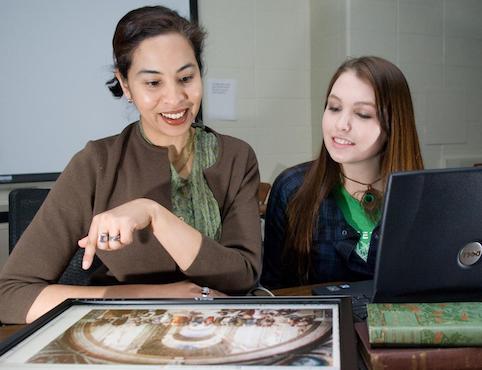Overview
The Literary Arts play a central, organizing role in the School of Literature, Media, and Communication, bringing our programs together through the lens of critical and intellectual inquiry, and through historically grounded creative practices that offer the indispensable “so-what?” to the “how-to” of our unit’s other arts programs.
The Literary Arts in LMC equip students, artists, and thinkers across Georgia Tech with the crucial historical and critical foundation they need to understand why art matters more than ever in the world today - not just for its aesthetic or moral value, but because it has the power to inform and transform the ways we think and care about one another and the world we will shape and shepherd into the future.
History
 “What is the role of the Literary Arts at a STEM School?”
“What is the role of the Literary Arts at a STEM School?”
This has been a guiding question for humanities experts at Georgia Tech since the university first opened its doors in the late 19th century.
As a small department that once offered only English courses, our School has evolved significantly through the years.
In 1992, it became the first of its kind in the nation to merge the Literary Arts with the study of science, technology, and culture, forming an innovative undergraduate degree in STAC (Science, Technology, and Culture).
For over 20 years, the STAC degree provided students with a flexible intellectual framework for the cultural study and production of artifacts that crossed the fields of science, technology, and the arts.
In 2014, the School expanded further to replace the STAC degree with a new undergraduate degree in LMC, one that matched our school name and better reflected the breadth of our growing curriculum in Literature, Media, and Communication.
Today, LMC majors can create an even more flexible, customizable degree path that includes concentrated threads in media, design, and social justice, along with our continued offerings in literary and creative arts, technical communication, and science, technology, and culture.
Importance of Literary Arts
The School of LMC’s grounding in the literary arts helps students to map and articulate their innovative visions for the future through a close study of human expression and movement across time. Our students explore questions like:
- What do literary and artistic contributions from different historical periods teach us about the priorities and issues of our current moment?
- How do science writing, conservation practices, and migration patterns of the past shape our present and future understandings of health and sustainability?
- How do shifting representations of people around the world and through the centuries inform the ways we understand and relate to one another today?
- How does our engagement with various media forms today depend upon longer histories of global communication, expression, and cultural contact?
Section 4
Blurb / Gallery Set

Technological Foundations
The importance of placing the Literary Arts — their history, and their cultural urgency — at the forefront of technological thinking and making is what sets the School of LMC apart from both traditional literature and creative production departments, as well as from traditional media and STS departments.

Innovation & Cultural Critique
The Literary Arts reflect and move across cutting-edge areas that have deep resonance in Atlanta and the world today, from science and technology studies to global diaspora studies, from medical humanities to environmental and social justice, all represented through a historical-cultural lens that centers the role of the arts in transformative change, from the early modern period to the future.

Beyond Disciplines
The Literary Arts in LMC engage students in diverse areas of inquiry that move beyond traditional disciplinary boundaries, from Literary and Cultural Studies to Women's and Gender Studies; from Medical Humanities and Ecocriticism to Postcolonial and Diaspora Studies; from Global Media Cultures to Science Fiction; from Race and Social Justice to Rhetoric and Technical Communication.
A Lasting Impact
In today’s School of LMC, we believe that students cannot become successful engineers, scientists, artists, writers, lawyers, doctors, managers, or technology experts without a solid foundation in global cultural history and expression that will guide their creative writing, thinking, making, and leadership in all fields.
The humanistic, cross-disciplinary lens of the Literary Arts in LMC thus offers a vital advantage to majors and non-majors alike at GT, as those who come through our programs will be well-prepared to pursue more thoughtful, culturally-engaged and historically-informed career paths in fields as diverse as engineering, medicine, law, research, computing, the arts, and beyond.

